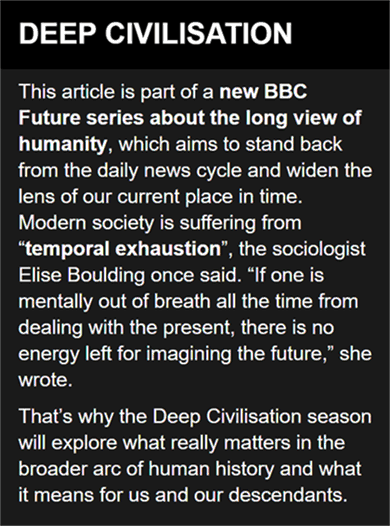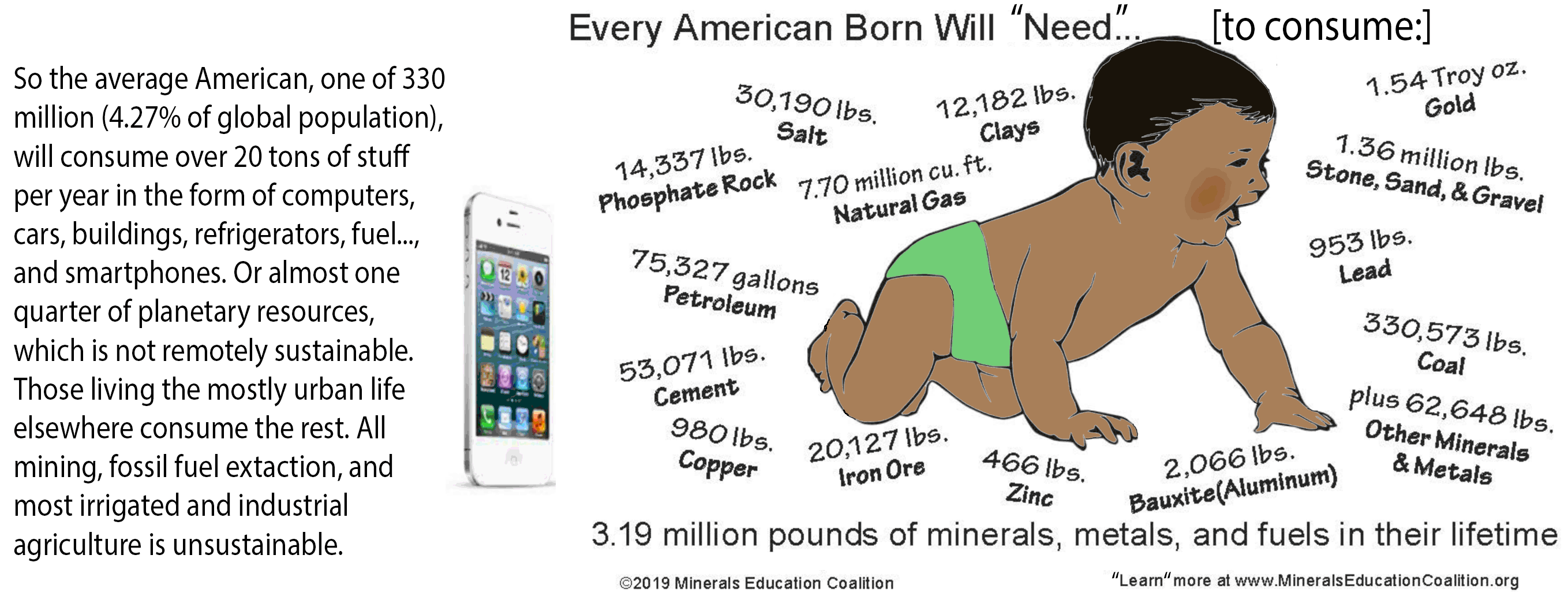
FRIDAY, JUNE 14, 2019: NOTE TO FILE

Is Civilisation About to Collapse?
Thus spake the BBC
Eric Lee, A-SOCIATED PRESS
TOPICS: KNOW-NOTHING, FROM THE WIRES, SOLUTIONS
Abstract: A feature article on the BBC's series about the future asks if we are on the road to civilisation collapse. The article, like thousands of others in all forms of media—social, mainstream, or what has become a blend of both, takes a 'yes, but...' form. Yes, there are serious concerns about...., but.... [a team of scientists in Uzbekistan are working on....].
COOS BAY (A-P) — Read BBC article: Are we on the road to civilisation collapse?
 The article is featured on the BBC's Future series/site [The focus: 'We believe in truth, facts, and science. We take the time to think. And we don't accept — we ask why.'] The article is the editors' number one pick. They use the title: 'Is civilisation about to collapse?', as click-bait that links to the 'Are we on the road to civilisation collapse?' offering. The series that began in January 2019 seems to be of, by, and for nerdy Millennials having trendy concerns for humanity and the environment (and their own future) who want to know 'what's the buzz? Tell me what's a-happening.' The site is click-bait journalism as usual, but on steroids (e.g.). But then I'm so old I remember the meme, 'Don't trust anyone over thirty.'
The article is featured on the BBC's Future series/site [The focus: 'We believe in truth, facts, and science. We take the time to think. And we don't accept — we ask why.'] The article is the editors' number one pick. They use the title: 'Is civilisation about to collapse?', as click-bait that links to the 'Are we on the road to civilisation collapse?' offering. The series that began in January 2019 seems to be of, by, and for nerdy Millennials having trendy concerns for humanity and the environment (and their own future) who want to know 'what's the buzz? Tell me what's a-happening.' The site is click-bait journalism as usual, but on steroids (e.g.). But then I'm so old I remember the meme, 'Don't trust anyone over thirty.'
The article follows a pattern I've been observing for years. As a teenager I listened to the BBC on shortwave to get what I hoped was a better, more global perspective (I still look over a BBC News [World] feed daily). I also listened to NPR (and still read their daily news feed listing offerings) and recall the news that the human population had reached seven billion (which it did early in 2011), and the voice in the ether noted concerns about what used to be called 'over' population. Yes, there are causes for concern, but.... The story ended on the obligatory positive note. I realized that this pattern of storytelling was actually obligatory, universal, and a pathology of storytellers that determines their telling of tales (I stopped listening to radio or watching TV at this time, and as my Facebook page is used to detail, social media isn't a source of information either, not even that of the BBC's Future page on Faceborg). Some may deeply believe in Science, Truth, and the Anthropocene Way, even in Facts (I used to believe in Truth, Justice, and the American Way, but I'm an ignorant know-nothing from the hood who just doesn't get it), but none of the claims made are matters of belief. Au contraire, truth, facts, and science are anything but matters of belief—the zeitgeist of belief-based cognitive pathology most swim in. I have come to call this 'yes, but...' sleight-of-mind trick the yes-but fallacy, one of many cognitive pathologies that have become normalized.
So the article from 10 January 2019, one of the first, maybe the first and still best (per editors) offering, ends:
The collapse of our civilisation is not inevitable. History suggests it is likely, but we have the unique advantage of being able to learn from the wreckages of societies past.
We know what needs to be done: emissions can be reduced, inequalities levelled, environmental degradation reversed, innovation unleashed and economies diversified. The policy proposals are there. Only the political will is lacking. We can also invest in recovery. There are already well-developed ideas for improving the ability of food and knowledge systems to be recuperated after catastrophe. Avoiding the creation of dangerous and widely-accessible technologies is also critical. Such steps will lessen the chance of a future collapse becoming irreversible.
We will only march into collapse if we advance blindly. We are only doomed if we are unwilling to listen to the past.
 To quote someone even older than I am, 'In the midst of life we are in death.' So, what—me worry? In the midst of civilisation we are in collapse. All prior civilisations (complex societies) have collapsed, descended, or 'faded away' (or been subsumed into another) depending on the degree of your temporal blindness ('History suggests it is likely', but how likely? The Greco-Romans knew about as much, or more, about Egypt [perhaps even where Ozymandias' shattered visage lies] as we know about the Roman Empire, which is really not quite like the one we live in, right?
To quote someone even older than I am, 'In the midst of life we are in death.' So, what—me worry? In the midst of civilisation we are in collapse. All prior civilisations (complex societies) have collapsed, descended, or 'faded away' (or been subsumed into another) depending on the degree of your temporal blindness ('History suggests it is likely', but how likely? The Greco-Romans knew about as much, or more, about Egypt [perhaps even where Ozymandias' shattered visage lies] as we know about the Roman Empire, which is really not quite like the one we live in, right?
Oh, how likely? Let's see, 100%..., so we learn from the wreckages..., never mind). And we also 'knew' what needed to be done. On Earth Day 1970 we took to the streets and otherwise protested, 20 million, 1 percent of the US population (Extinction Rebellion recently managed 0.015% in UK, much less worldwide). We shook our fists and yelled, and still do; meanwhile the pace of planetary destruction has not slowed, though rivers no longer catch on fire as often, but still the pace of planetary....
And just because, let's unpack the next to last paragraph: 'We know what needs to be done: emissions can be reduced [I recall the LA air being thickly visible and wearing a mask, just like some do in China, hence the pace of...], inequalities levelled [but are selected for, have and are increasing, hence the pace...], environmental degradation reversed [from current 95% of land surface having been visibly degraded as seen from satellites because 1% of Americans in 1970 failed to reverse the pace of...], innovation unleashed and economies diversified [we too were clever apes and as Dustin Hoffman learned, the answer is 'plastics' which diversified the economy wonderfully]. The policy proposals are there. Only the political will is lacking [as it was in 1970, meanwhile the pace...]. We can also invest in recovery. There are already well-developed ideas for improving the ability of food [permaculture?] and knowledge systems [semantography?] to be recuperated after catastrophe [Svalbard Global Seed Vault that now includes digital information?]. Avoiding the creation of dangerous and widely-accessible technologies is also critical [e.g. smartphones]. Such steps will lessen the chance of a future collapse becoming irreversible [unlike steps taken by all prior complex societies to avoid descent or avoid repeating the pattern post-descent with the possible exception of the Tairona phase 3 iteration].
Understanding the dynamics of our pending Seneca descent is of interest to those having existential concerns for humanity and the biosphere who would rather know than believe, but not to BBC readers, voice hearers, vid watchers, or journalists (and everyone else) who want to hear that, yes, there are problems those sciency types keep telling us about, and yes, we're not like those who deny, deny, deny, and we love and Like science, but surely 'We will only march into collapse if we advance blindly. We are only doomed if we are unwilling to listen to the past.' The right policy proposals are here, we have them, they just need to be voted on by an informed public.
We right-thinking educated know-a-lots deeply believe in the endeavor to think well, but that we often drop the ball is not something we like to think about, so, well, let us flinch. We have choices. We can choose to not march into collapse. We have a vote. We know what the right policies are, so we just have to vote for our persistence as a civilisation (and species), and we who are well informed about the past, unlike the 99% who are not, will advance into our futurity with eyes wide shut, as usual.
So, what, is this some doomer rant? No, I'm not suggesting you, accomplished consumers from birth, buy into stupid shit talk just because it feels good, which it does to doomers who get off thinking they are so much better informed and smarter than all you ditto-heads out there. I'm a cornucopian optimist living on an abundant Earth. I'm suggesting that you consider the possibility that you (and I) are the dynamic (empire-building growth hegemon) that has, so far, always selected for its own failure. Listen to Nature who has all the answers.

To paraphrase someone even deader but less forgotten than I'm soon to be, 'To understand something is to be delivered from it.' [Baruch Spinoza] So if you want to be delivered from the dynamic of overshoot and collapse (growth's mandate), understand the dynamic, the system that you are a subsystem of. Don't be distracted by cliodynamics and other sciency seeming academic pseudo-scholarship (e.g. conventional economics). You may be 'insatiably curious', but do vet your sources.
To quote from the prattle of perhaps the ultimate old fart (aka Old Boy): 'Knowing that you do not know is the best. Not knowing that you do not know is an illness.... True words are not pleasing. Pleasing words are not true. Those who are right do not argue. Those who argue are not right. Those who know are not learned. Those who are learned do not know.' — Laozi
Education: that which reveals to the wise, and conceals from the stupid, the vast limits of their knowledge.... I have never let my schooling interfere with my education. —Mark Twain
Self-education is, I firmly believe, the only kind of education there is. — Isaac Asimov
The more he became truly wise, the more he distrusted everything he knew. — Voltaire
Philosophy is a battle against the bewitchment of our intelligence by means of our language. — Ludwig Wittgenstein, who was not a postmodernist nor an ecomodernist.
Modern science should indeed arouse in all of us a humility before the immensity of the unexplored and a tolerance for crazy hypotheses. — Martin Gardner

Graphic from Past Lives of Humans.
